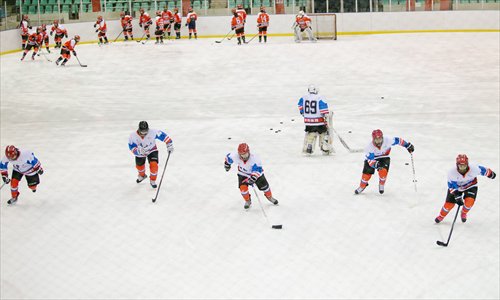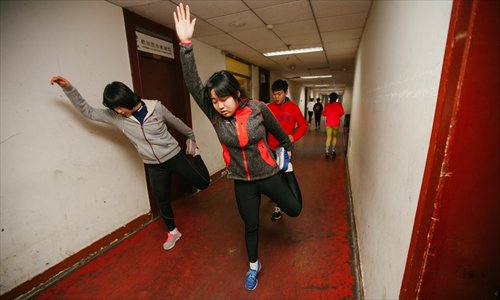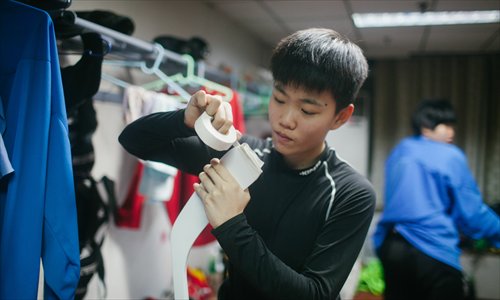China’s ice hockey teams face player shortage despite public enthusiasm
Beijing being chosen to host the 2022 Winter Olympic Games has given a fresh impetus to the development of winter sports. The government has decided to make such sports a national phenomenon and to have "300 million people on ice." The public has responded to these ambitions with enthusiasm, however, the national ice hockey team is still hard pressed to find professional-standard players who have the passion and resolve to compete in 2022.

The Harbin women's ice hockey team plays a game. Photo: Li Hao/GT
On a January morning, it can reach 20 degrees Celsius below zero in Harbin, capital of Northeast China's Heilongjiang Province. Braving the chill, Wang Wenzhuo put on her winter gear and headed out her front door. It was only 5 am and dawn was still hours away, but for Wang and her teammates, it was the start of another day's training.
Wang, 18, plays for the Harbin women's ice hockey team. Two weeks before the start of China's 13th National Winter Games, it is business as usual for Wang and her teammates.
Wang has already been selected by the national team and will be playing in the 2022 Winter Olympic Games. The Harbin team of about 20 people is one of the two only professional women's ice hockey teams in China and together, they provide a small pool of players for the national team to choose from.
However, not much has changed for the professional teams since Beijing and Zhangjiakou successfully applied to host the 2022 Winter Olympic Games. Right now, the players haven't directly benefited, no extra funding has been given, nor more recruits. It's too soon to talk about the 2022 games, Sun said.
The national women's ice hockey team was once strong and has won medals in the past. However, the professional scene has deteriorated since the 1990s. Right now, the national team faces an extreme shortage of players. At the same time, after the Chinese government's call to popularize winter sports before the 2022 games, ice hockey is more popular than ever with the public. But the situation at the professional level shows no sign of improvement.

Team members stretch together. Photo: Li Hao/GT
Losing numbers
China's women ice hockey team was once one of the best in the world, said Sun Rui, national team player and coach of the Harbin team.
When Sun started playing professional ice hockey for the Harbin team in 1998, the sport was at its peak in China.
"Back then there were 12 professional teams and competition was fierce," she said. "Winning back then wasn't easy, not even for the Harbin team."
Later Sun was chosen to play for the national team. At the 1998 Nagano Winter Olympic Games in Japan, China's women's ice hockey team came in fourth place. In the 2002 games in Salt Lake City and 2010 games in Vancouver, China won seventh place.
In recent years, the Chinese ice hockey team's world ranking fell to around 15.
"There are only two teams to choose national players from, the Harbin team and the Qiqihar team, a total of about 40 people," Sun said. "We are extremely short of players."
The players for the Harbin women's team are usually chosen from among the students at the Harbin Sports Academy. But it's always difficult to recruit women, because many people think ice hockey is a rough sport and not suitable for women, Sun said.
Sun, who is 33, started thinking about retirement after the Toronto Winter Olympic Games in 2010. But for the last five years, she kept coming back to the rink because there was nobody to take her place. In April 2015, she played once again for the Chinese national team during the Ice Hockey World Championships.
As the coach for the Harbin team, Sun sees that the current situation is limiting her layers' development.
"When you look at Beijing or Shanghai, there are many ice hockey clubs, and the children there play thousands of games every year, we are very jealous of them," she said. "The Harbin team only plays around 10 games every year, maybe playing only one game against the national team every year."
The players are always in training, but can only reach an international standard by regularly playing games against other professional teams.
"They are well trained, but it's scary for me to imagine what the future will look like," she said.

Wang Wenzhuo wraps tape around her hockey stick. Photo: Li Hao/GT
Under the juguo system
Wang has been playing ice hockey since she was 10. Her elementary school in Qiqihar provides ice hockey classes for children and she thought it was interesting. She was always restless as a kid, and felt ice hockey was a good way to let off steam.
Because of her talent and performance, after elementary school, she was sent to a special athletics secondary school in Harbin to focus on ice hockey training. Then she entered the Harbin women's team in 2013 and was chosen to play for the national team at the end of 2015.
Wang's trajectory is typical of a professional athlete under the juguo (whole nation) system. Under this highly centralized system, children with athletic talent are sought out and put into special academies and some are chosen by professional sports teams. Then a small pool goes on to the national team and strives to win medals for China in international competitions.
Many attribute the decline of professional ice hockey to the centralized system. Since the 1990s, local governments gradually stopped sponsoring ice hockey teams and players started quitting. One reason is that an expensive sport like ice hockey doesn't generate high financial returns in a short amount of time.
"If a player enters the professional team, during her training she needs at least five or six sticks per year. Counting all the equipment, it totals to about 10,000 yuan ($1,520) per year, and that's not including renting an ice rink, traveling, food and accommodation," Sun said.
Yu Tiande, director of the ice hockey department of the China Winter Sport Federation, told the Beijing Daily that the sport's deterioration is a vicious cycle. First, local governments reduced funding, which lead to teams performing poorly, which meant the popularity of ice hockey decreased, and as such even fewer governments were willing to sponsor teams.
Besides, the time invested in creating a professional player is also great. One needs two to three years to learn how to skate skillfully, and then years to learn how to actually play the sport. It could take eight to 10 years, Sun said.
On the player's end, many chose to quit because of the high cost or because the field is so narrow once they enter professional teams.
Wang Wenzhuo's mother, surnamed Zeng, said she saw a few of her daughter's teammates quit along the way. Some quit because of old injuries, some because it's a difficult road, since there are only two professional teams and the prospects of a career in the sport aren't promising.
She and her husband thought about whether they should let their daughter keep training, especially seeing how rough-and-tumble the sport can get.
"But she likes it and we thought she should just keep going," Zeng said.
Besides, Zeng said she thought Wang could become a coach even if she doesn't make it into the national team, which will offer her a career path.
300 million on ice
In contrast to the professional team's difficult situation, winter sports such as curling, ice hockey and skating are becoming more common in big cities, in line with the government's wishes.
When Beijing was applying to host the 2022 Winter Olympics, the government decided to attempt to make winter sports a national phenomenon and to have "300 million people on ice."
On December 15, 2015, the Winter Olympics Committee was established in Beijing to prepare for the 2022 games. The committee began working towards achieving that goal and their first step was to build more winter sports facilities in China, such as snow parks and skating rinks. The government's PR machinery kicked into action, hoping to create public enthusiasm around winter sports similar to the "ping pong fever" seen in the past few decades.
In Beijing, ice hockey is one of the fastest growing winter sports. There are currently around 1,800 players registered with the Beijing Ice Hockey Association in the capital, and 96 teams competed in the 2014 Beijing Youth Ice Hockey Championships, 20 more than in the previous year, according to the association's data.
One reason is that many well-educated parents are influenced by Western culture, so they send their children to learn the sport as it is popular in Europe and North America.
Sun said she is happy to see these changes, knowing more and more children are learning the sport, but it will take many years before public enthusiasm can change the situation of professional ice hockey in China.
Right now, many of these parents only want their children to play as a hobby and not professionally. One reason for this is that despite the growing popularity of the sport and government investment there is still a lack of resources - although there are roughly 20 Beijing primary school teams, there is at present only one middle school ice hockey team and no high school ice hockey teams in the city.
Another reason is that athletes that are trained under the centralized system differ from the ones trained in the clubs.
"Once you enter a professional team, you need to give up academics, live in dorms and under military rules, it's totally different from the clubs that provide concentrated training twice a week," Sun said. "The centralized system has already formed and professional teams don't interact with amateur clubs. It will take time.
Newspaper headline: Frosty ambitions